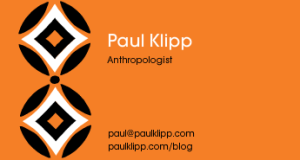 When I choose to self-identify as an anthropologist on my Twitter profile, David Hussman asked me that question. It irked me because the best I could come back with was something like “I am trained as an anthropologist and I use what I learned all the time.” Damn it. I should have said, discount
When I choose to self-identify as an anthropologist on my Twitter profile, David Hussman asked me that question. It irked me because the best I could come back with was something like “I am trained as an anthropologist and I use what I learned all the time.” Damn it. I should have said, discount
“Yes.” with a nice big solid period afterward. In either case, the conversation stopped there. In my mind, I hemmed and hawed. Well, I DO have a degree in anthropology. I DID study it for seven years in both undergraduate and graduate programs at major universities. I use ethnographic methods in most of the jobs I’ve had since. The principles and practices I’ve learned have allowed me to flourish in otherwise frightening environments from prisons to foreign countries. I’m a member of the American Anthropology Association and the Society for Applied Anthropology. I keep up with all the major anthropology journals. But I have never in my life carried a business card with the word “anthropologist” anywhere on it.
What are we to say to such a question? How many of us, trained by anthropologists with the word “anthropology” on our degrees actually have that word in our job titles? Certainly, if you have a Ph.D. in anthropology and you are employed by a university to teach in the anthropology department and you use your research time to take public money to conduct ethnographic research and publish ethnographies than yes, I suppose you’re definitely an anthropologist. But what about the rest of us? The design researchers, the marketing consultants, the international human resource managers, the public and non-profit sector project and program managers and all those other fields that actively recruit people with our training, tools and mindset because it’s valuable in those fields? Are we anthropologists, too?
I’m gonna take a bold stand and just say “Hell, yes.” I’m tired of being wishy-washy about it. It’s me. It’s you. It’s our self-identity. Own it, and show them what we can do. If we all did that, not only would people stop asking the question, but we’d no longer have to explain or justify ourselves all the time. The good work done by anthropologists working outside academia would speak for us every time a reporter, manager, or even guy on the street re-told a story about the successes attributed to us, the anthropologists in their midst.

Comments on this entry are closed.
I regularly contemplate this exact same question of professional self-identity. Even though I’m fairly new to the professional world, I have had numerous experiences (both on the job and looking for a job) to try on different professional titles to see which ones fit and which ones don’t. What I’ve realized so far is that in the field I work in (product/service research and design), it has been more helpful for me to NOT call myself an anthropologist. No matter what you read about anthropology and ethnography being trendy and having a growing presence in the private sector, it seems that most people still aren’t quite sure what they are or what anthropologists can actually do.
For me, it has been more effective to use the language of the people I work with and for – my employer, clients, coworkers, whomever – which also reflects the type of organization I’m working in (e.g., a large corporation, a small design agency, etc., each with its own cultures/languages). People seem to care the most about what kinds of problems you can solve, and less about your disciplinary background. So I’ve used titles like User Experience/UX Researcher, Consumer Researcher, Qualitative Analyst, and others tailored to my audience and what their goals are. It took me a while to let go of the “I’m an anthropologist!” approach, but I had to because it wasn’t really getting me anywhere within organizations, not to mention landing me interviews when I was trying to find a job. Not that I don’t assert my anthropologist identity at all, it’s just that I’m more selective about the time and place (I always do with other anthropologists, of course). I think it can be both a positive and negative differentiator – it can set you, your perspective and your skills apart, or it can carry connotations like “academic” or “out of touch” or imply that your work doesn’t lead to anything useful. Mostly it just seems to confuse people.
It would be great if we could just introduce ourselves as anthropologists and not get the typical responses and questions we’re all used to about archaeology or not making any money or application to solving problems. And if we don’t ever tell anyone that we’re anthropologists, it’s not going to help our cause, because people should know that anthropologists can do great work. We just need to be more strategic about it and continue to look for ways to create a bigger and more influential presence in areas where there is still confusion about our existence. The more we work on our brand image/PR, the more familiar non-anthropologists will become with our discipline, the more valuable we will become to organizations/employers/the public, the more knowledgeable people will be about what we actually do, and the more others will see our potential to make a difference and solve real world problems.
If you’re interested, check out a recent blog post of mine where I discuss this topic: http://anthropologizing.com/2013/11/18/what-do-dinosaurs-have-to-do-with-insurance-a-lesson-in-advocating-for-anthropology-in-the-workplace/